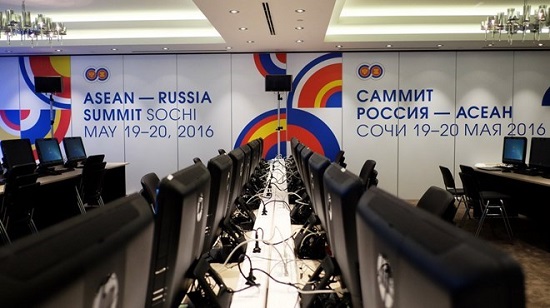Russia-ASEAN Summit to affirm bilateral ties' growing significance
The Russia – ASEAN Summit, marking 20 years of their dialogue partnership, in the Russian city of Sochi on May 19-20 affirms the growing importance of bilateral relations, as well as ASEAN’s special status in Russia’s policy towards Southeast Asia.
The summit is also an opportunity to outline cooperation orientations to bring their relations on par with potential and interests.
The geo-political, economic, cultural and military features of the ASEAN Community, set up on December 31, 2015, as well as of each of its 10 member nations have helped promote the stature of the bloc in the Asian-Pacific region.
 |
| The Russia – ASEAN Summit takes place in the Russian city of Sochi on May 19-20 (Photo: sputniknews.com) |
ASEAN, boasting a combined population of about 630 million, GDP of some 2.57 trillion USD and stable economic growth, has been recognised as an important factor in the dynamic development of the region. Russia has affirmed several times that cooperation with ASEAN will help the country increase its standing in Asia – Pacific.
Russia holds a critical role in solving global security issues. With its geographical location and traditional relationships, Russia has specially strategic interests in Asia – Pacific and Southeast Asia.
Russia’s intensification of connections with the ASEAN Community and its more active role in regional mechanisms such as the East Asia Summit, the ASEAN Regional Forum and the ASEAN Defence Ministers’ Meeting Plus will help increase its contributions to peace, security and stability in ASEAN and the Asian – Pacific region.
In the last five years, trade turnover between Russia and the ASEAN nations doubled and hit a record 21.5 billion USD in 2014. Russia mainly exports fuel and energy, advanced machinery, military equipment and chemical products, which the ASEAN nations have high demand for. The bloc’s members are rich in agricultural and manufactured commodities, which Russia needs.
However, bilateral cooperation is yet to live up to its potential in comparison with ASEAN’s relations with other dialogue partners like China, Japan, the Republic of Korea, India and Australia.
Amidst numerous developments around the world, both Russia and ASEAN face considerable traditional and non-traditional challenges and threats at global, regional and national levels.
While the threats of terrorism and extremism are rising, environmental pollution and climate change are looming in every country. Disagreements and tensions regarding territorial disputes and the ambitions of some countries in Asia – Pacific, especially in the East Sea, threaten regional stability and security.
Isolation as a result of sanctions imposed by western nations and the oil price nosedive have negatively impacted Russia’s economy. Meanwhile, differences and development gaps among the ASEAN countries are hampering the bloc’s development.
In the face of this, Russia and ASEAN are moving closer together. Russia considers strong cooperation with ASEAN key to promoting its standing in Asia – Pacific. ASEAN leaders have expressed their willingness to tighten links with Russia.
That is a reason for Russia to choose “Towards Strategic Partnership for the Sake of the Common Good” for the Russia – ASEAN Summit.
While fostering ties with ASEAN, Russia has regarded Viet Nam as an important and effective gateway to help Moscow integrate into Southeast Asia, given the two countries time-honoured relationship and mutual trust.
Russia hopes that the unceasing advance of the Viet Nam – Russia comprehensive strategic partnership will be a role model for it to reinforce ties with other ASEAN nations.
The Russia – ASEAN Summit is believed to create a foundation for both sides to upgrade their dialogue partnership to the strategic level. They are looking towards a closer and more effective, dynamic relationship which will help ensure peace, stability, development and prosperity in the region.
(Source: VNA)